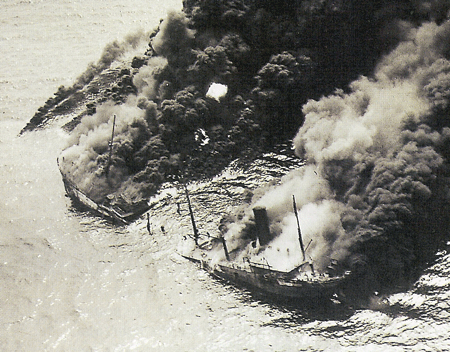Family seeks closure from WWII off NC coast
- On 19/08/2011
- In Miscellaneous
- 0 comments

By Brock Vergakis - Muscatine Journal
Nearly 70 years after Capt. Anders Johanson was killed during World War II off the coast of North Carolina, his family is getting ready to finally pay their last respects.
Johanson was aboard an oil tanker making its way from Texas to New Jersey when a German U-boat fired three torpedoes at the Dixie Arrow on March 26, 1942, bursting thousands of barrels of oil aboard the ship into flames off of North Carolina's Outer Banks. His family will revisit the site of the wreckage Wednesday.
Survivors of the blast who were brought to Norfolk after being plucked from the sea told reporters at the time that Johanson survived long enough to order boats and life rafts launched _ which helped save 22 members of the 33-man-crew _ before being engulfed in searing flames as the ship sank. His body was never recovered.
More than half a century later, his family is still trying to come to terms with his death.
"He stopped in Jacksonville (Fla.) and asked for a destroyer escort and the destroyer came out and said, `Sorry brother, everything's OK. Don't worry about it," said Johanson's grandson, Dale Revels of Orlando, Fla., who along with his mother and uncle will be visiting the wreckage site for the first time as the guests of federal researchers examine World War II wrecks.
"It was basically a personality failure of the American Navy."
Johanson never received the public recognition that so many others who lost their lives in World War II did. There was no funeral for his wife and two young children to honor the Swedish immigrant, who was on his last cruise for the Merchant Marine before rejoining his family in Brooklyn, N.Y.
Johanson's family struggled in the chaos after his death. They were uprooted from New York and had to stay with family in Beaumont, Texas before a family death there left them with no home. They stayed at boarding home in New Orleans before eventually moving in with other family in Belleview, Fla., where questions for the newcomers were constant.
"When I was going through high school, I didn't have a father. During that time everybody seemed to have a mother and a father and people would ask me, `Where's your father?'" said Johanson's daughter, Jeanne Johanson Revels, now 83 and living in Port Orange, Fla.
"They had this big campaign about loose lips sink ships in 1942 during World War II. Those two men came to see my mother said we couldn't say anything about it. I guess it was classified information and you couldn't talk about it at all."
Add a comment